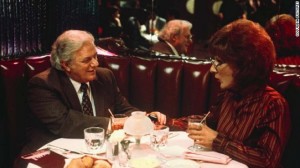Tributes: Jack Klugman and Charles Durning
Posted on December 26, 2012 at 3:08 pm
The passing of Jack Klugman and Charles Durning, two actors with decades of fine performances in movies and television, reminds us that they made very significant contributions in other ways as well. The New York Times points out that both men were successful not because they looked and acted like movie stars but because they looked and acted like real people.
Mr. Klugman and Mr. Durning had their star turns too, but their careers were fueled more by supporting roles and ensemble work, jobs that require a different skill set, a knack for being plain old joes. So while “Tootsie” was a vehicle for Mr. Hoffman and “The Sting” was a showcase for Mr. Newman and Mr. Redford, who was that, a little way down the credits list in both films? Mr. Durning.
That’s not to say his or Mr. Klugman’s performances were ordinary. Mr. Durning earned an Oscar nomination (the first of two) for his flashy turn as the governor of Texas in the 1982 film “The Best Little Whorehouse in Texas”(though, again, he was a secondary character, supporting Burt Reynolds and Dolly Parton). And Mr. Klugman won two Emmys for his work in the 1970s sitcom “The Odd Couple” — tellingly for playing a classic one-of-the-guys character, the slobby Oscar Madison, in a show that was essentially a two-man ensemble piece (Tony Randall being the other half of the “couple”).
 Jack Klugman is best remembered for his starring roles in two long-running television series, as the slob half of The Odd Couple
Jack Klugman is best remembered for his starring roles in two long-running television series, as the slob half of The Odd Couple and as the feisty medical examiner in Quincy, M.E.
I especially like his performance in the classic “Twelve Angry Men.” But his most powerful influence may be in his work for “orphan drugs.” The Washington Post tells the story of how “he also played an instrumental role in passing critical health-care legislation, the Orphan Drug Act, through Congress in the early 1980s.”
The issue of orphan diseases was so obscure that only a single newspaper, the Los Angeles Times, sent a reporter to the hearing (and the Times only did so because a local boy suffering from Tourette’s testified). But the article caught the eye of a Hollywood writer and producer named Maurice Klugman, who himself suffered from a rare cancer and also happened to be Jack Klugman’s brother. Maurice Klugman wrote an episode of “Quincy” about Tourette’s and the orphan drug problem.
To capitalize on the publicity and build momentum for a bill, Rep. Henry Waxman (D) of California, the subcommittee chairman, invited Jack Klugman to testify before Congress. Nowadays on Capitol Hill, you’re as likely to run into Bono or Ben Affleck as your own representative. But at the time, a bona fide celebrity speaking to Congress was a huge deal. The New York Times ran a front-page story on Klugman and orphan diseases. That led to a bill with three big incentives for drug makers: a lighter regulatory burden for developing new orphan drugs, a seven-year monopoly, and a 90-percent tax credit for the cost of clinical trials. It also established an Office of Rare Diseases at the National Institutes of Health.
In a fit of pique, Jack Klugman hit upon a novel idea. He and his brother wrote a second “Quincy” episode, this one revolving around an orphan drug bill that was being held up by a heartless (fictitious) senator. In the pivotal scene, Quincy confronts the senator in his office and demands that he look out the window. Peering down, the senator sees a huge crowd gathered with signs that read “We Want the Orphan Drug Act” and relents. To shoot the scene, the show’s producers hired 500 extras who really did suffer from rare diseases….Thanks to Klugman, the Waxman-Hatch Orphan Drug Act became law in 1983. In an ending Hollywood might have scripted, it has been a remarkable success. The FDA has approved more than 300 orphan drugs, with 1,100 more under development. One of the first developed under the law was AZT, the early AIDS treatment. Two years later, Congress expanded the law to include biological and chemical drugs, which helped spur the biotech industry.
Charles Durning was one of the most talented and durable of character actors. He often played a cop (“The Sting,” “Dog Day Afternoon,” “Sharkey’s Machine”), or a politician (President in “Twilight’s Last Gleaming,” Senator in “The Final Countdown,” mayor in “State and Main,” and an unforgettable Governor Menelaus Pappy “Pass the Biscuits” O’Daniel in “O Brother Where Art Thou”). He was nominated for an Oscar for his role as another governor in “The Best Little Whorehouse in Texas,” where he showed himself an unexpectedly light-footed song and dance man. I especially loved him as Burt Reynolds’ sympathetic brother in “Starting Over” and as Jessica Lange’s father with a crush on “Dorothy” in Tootsie.
 Durning was a decorated WWII veteran who received three Purple Hears and a Silver Star. He was in the first wave of soldiers to land on Omaha Beach during the D-Day invasion of Normandy. He was the only man in his unit to survive a machine-gun ambush. Despite suffering serious machine gun and shrapnel wounds, Durning killed seven German gunners. Later, he was stabbed eight times by a German soldier but managed to kill him with a rock. He was released from the hospital just in time to fight in the Battle of the Bulge, where he was taken prisoner. He seldom spoke about the devastating emotional impact of his wartime experience, and the description of this part of his life in his obituaries is a powerful reminder of how much more there is to learn from the people who are (sometimes literally) not the star of the show.
Durning was a decorated WWII veteran who received three Purple Hears and a Silver Star. He was in the first wave of soldiers to land on Omaha Beach during the D-Day invasion of Normandy. He was the only man in his unit to survive a machine-gun ambush. Despite suffering serious machine gun and shrapnel wounds, Durning killed seven German gunners. Later, he was stabbed eight times by a German soldier but managed to kill him with a rock. He was released from the hospital just in time to fight in the Battle of the Bulge, where he was taken prisoner. He seldom spoke about the devastating emotional impact of his wartime experience, and the description of this part of his life in his obituaries is a powerful reminder of how much more there is to learn from the people who are (sometimes literally) not the star of the show.
